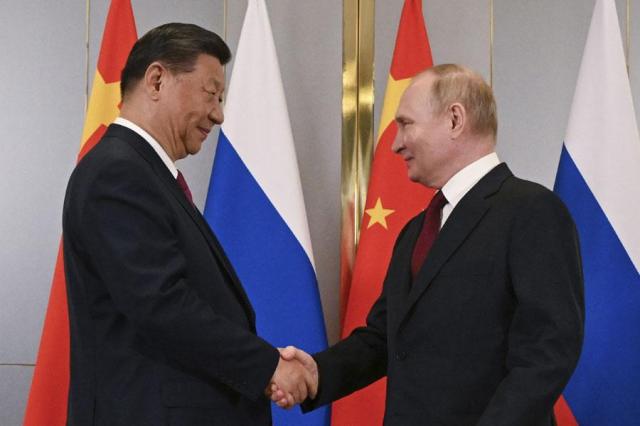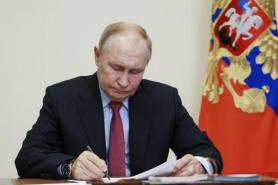
Meanwhile, the west sees China as far too helpful to Russia. The sentiment in the west was best captured on July 10, 2024, during a summit in Washington D.C. Heads of state and government of NATO countries jointly proclaimed that China is a "decisive enabler" of Russia's war against the Ukraine, and also called on China "to cease all material and political support to Russia's war effort."
To the west, China's aid, though short of actual weapons supply, is more than enough to fuel Russia's war machine. This in turn poses a security threat to Europe.
But NATO's message and Russia's implicit code to China seem to indicate one thing: Beijing's fence sitting days are numbered, and it needs to choose a side. Unfortunately for Russia, China may be forced to pick the west.
Signs that China is already pivoting to the west have started to appear. Speculation was rife in late 2023 that China's panda diplomacy (where it gifts the lease of the bears to foreign zoos) was on the way out amid worsening ties with the west.
But in mid-2024, Beijing sent more pandas to Spain and Vienna, as well as the U.S. tech center of California. President Xi Jinping also went on state visits to the U.S., Europe, Australia and New Zealand to mend ties with the west.
Beijing's Russian headache
China knows that the war has had catastrophic consequences for both Russia and Ukraine. Estimates indicate that Putin's conflict in Ukraine could cost Russia US$1.3 trillion (£1.0 trillion) and at least 315,000 in troop casualties. So, win or lose, the post-war damage to Russia would be immense.
This is bad news for China. Not only will it have a weakened ally, but the west could then have a free hand to consolidate its resources in dealing with the "Chinese threat." This concern isn't unfounded. After all, a substantial portion of Americans view China as the greatest enemy of the U.S., and China is sometimes characterized as a member of an "axis of evil" alongside Russia, Iran and North Korea.
So, the Chinese government needs to hedge itself against becoming the "target of all arrows" (众矢之的), as the famous Chinese saying goes, resulting from Russia losing the war in Ukraine. Reviving panda diplomacy and sending China's leaders on state visits then become tools to mend ties with the west, and serve as insurance policies.
But NATO's criticism of China in July 2024, which echoes a similar statement by U.S. secretary of state Anthony Blinken in late April 2024, suggest that these soft power initiatives are insufficient to appease the west.
China needs to press Russia to sue for peace with Ukraine. With this, Russia gets to preserve its national strength, while China could concentrate efforts in being the world leader in AI, and healing its ailing economy.
Economic performance
For months, China has been reeling from a real estate crisis, a volatile stock market, a massive 288-percent debt-to-GDP ratio, as well as high youth unemployment. And recently, Chinese government bond prices soared from increasing demand, suggesting that investors are seeking safer investment alternatives as confidence in the Chinese economy remains low.
But a battered economy isn't the only problem the Chinese government faces. It has traditionally employed economic performance to legitimize its rule. So given the poor economic climate, Beijing needs to jump-start its ailing economy to maintain power.
However, there is one major flaw with Beijing's economic growth strategy: it centers around exports, which relies heavily on western demand. While China has increased its exports to various regions across the world, almost 30 percent of its exports in 2023 were meant for the U.S. and the EU.
As it stands, cracks are surfacing in Beijing's export plans. In May 2024, the U.S. raised tariffs on Chinese electric vehicles (EV) to 100 percent. The European Union followed suit by raising its own Chinese electric vehicle tariff from 17.4 percent to 37.6 percent, which comes on top of an existing 10-percent duty imposed on all Chinese electric vehicles coming into Europe.
But things may get worse for China's economy depending on what it does with Russia. A day after NATO's proclamation, U.S. President Joe Biden announced that China's continuous support of Russia will bear dire economic consequences for the Asian superpower. He added that "some of our European friends are going to be curtailing their investment in China," alluding to what China might face if its support for Russia continuous.
For its own sake, China is hoping that the war ends with a peace settlement that favors Russia. Failing this, China's sense of self-preservation will put its partnership of no limits with the Kremlin to the test. After all, as the quote widely attributed to the 19th century British prime minister Lord Palmerston goes, "There are no permanent enemies, and no permanent friends, only permanent interests."
-------------------------------------------------------------------------------------------------------------------------
Chee Meng Tan is an assistant professor of business economics at University of Nottingham in England.
This article was republished under a Creative Commons license with The Conversation. The views and opinions in this article are solely those of the authors.
https://theconversation.com/china-needs-to-pick-a-side-and-it-just-might-pick-the-west-234021
Copyright ⓒ Aju Press All rights reserved.



